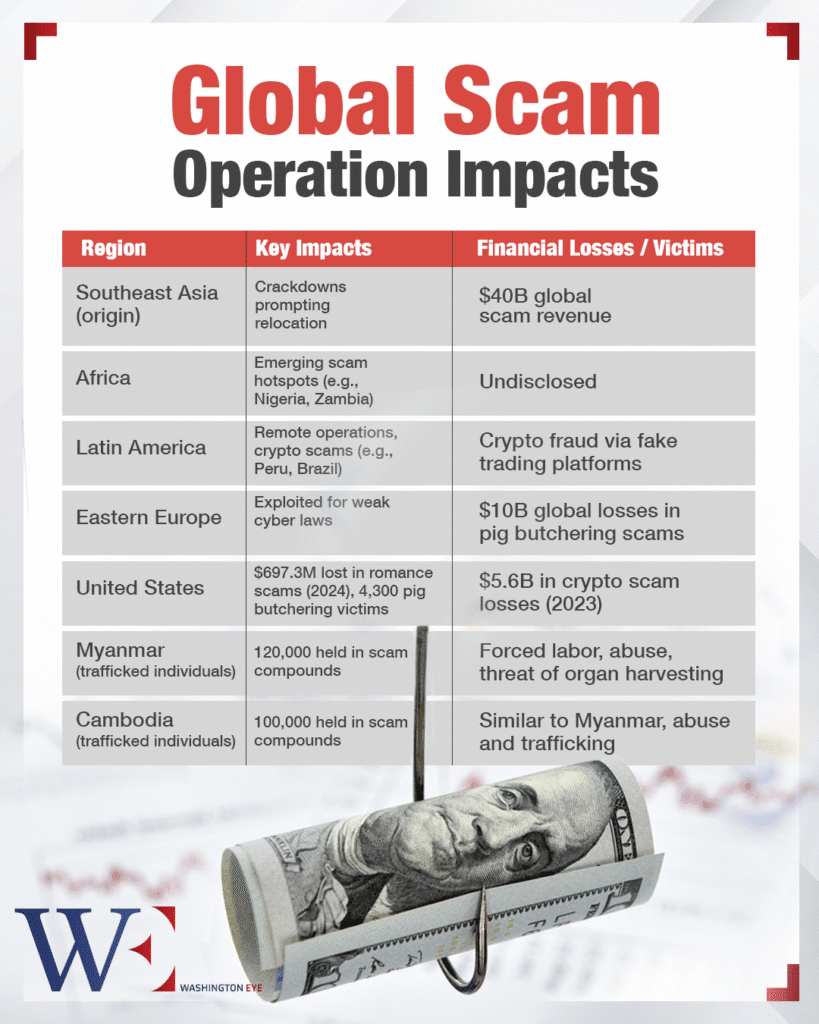Once confined to Southeast Asia, particularly in countries like Cambodia, Laos, and Myanmar, scam operations orchestrated by Asian crime syndicates have now expanded their reach globally. The United Nations Office on Drugs and Crime (UNODC) reports that these operations are generating nearly $40 billion annually through various fraudulent activities, including romance scams, fake investment schemes, and illicit online gambling. This expansion is partly a response to intensified crackdowns in Southeast Asia, prompting these syndicates to relocate to regions with weaker law enforcement, such as parts of Africa, Latin America, and Eastern Europe.
The Mechanics of Modern Scam Operations
These scam operations often involve large compounds where trafficked individuals are coerced into conducting online scams. Victims are lured with promises of legitimate employment but find themselves trapped in conditions akin to modern slavery. Their passports are confiscated, and they face threats of violence or worse if they fail to meet scam quotas. Technological advancements have further empowered these operations; the use of artificial intelligence, deepfakes, and cryptocurrencies make it easier to deceive victims and launder money, complicating efforts to trace and dismantle these networks.
Global Hotspots and Notorious Scams: Who’s Getting Hit the Hardest?
By 2025, the reach of Asian-organized scam operations has expanded far beyond their initial strongholds in Southeast Asia, now deeply affecting countries across Africa, Latin America, and parts of Europe. These syndicates are adapting quickly, exploiting regions with limited cyber enforcement capacity and regulatory oversight. Law enforcement actions in early 2025 in countries like Nigeria, Zambia, and Angola have revealed growing local footholds for scam infrastructure, often linked to trafficking networks relocating from Myanmar and Cambodia.
Latin America has also emerged as a major target zone. Brazilian authorities have reported a surge in online financial scams, many operated remotely through fraudulent crypto trading platforms linked to Southeast Asian crime syndicates. In a striking case in Peru in late 2023, authorities rescued over 40 trafficked Malaysians who had been forced to perpetrate cyber fraud under threat of violence — a scenario that’s becoming more frequent as scam centers globalize their labor sourcing.
Among the most infamous scams now circulating worldwide is the “pig butchering” scheme — a long-con tactic involving emotional manipulation and fraudulent crypto investments. The FBI reported that in 2024 alone, over 4,300 victims in the U.S. were directly affected by this scam, with global financial losses from such frauds reaching nearly $10 billion. Romance scams more broadly continue to flourish in the U.S., nearly 59,000 people lost an estimated $697.3 million in 2024, primarily through dating app and social media cons that escalated into financial exploitation.
Human Trafficking and Exploitation
A disturbing aspect of these operations is the human cost. According to the UN, at least 120,000 people in Myanmar and 100,000 in Cambodia are being held in scam compounds under duress. These individuals are often subjected to physical abuse, forced labor, and in some cases, threats of organ harvesting. The international nature of these crimes means that victims come from various countries, including Brazil, Nigeria, Sri Lanka, and Uzbekistan, highlighting the global reach and impact of these syndicates.
Challenges in Combating the Spread
Law enforcement agencies face significant hurdles in addressing this issue. The transnational nature of these crimes, coupled with the use of sophisticated technology and the exploitation of jurisdictions with weak governance, makes it difficult to coordinate effective responses. Moreover, the profitability of these operations provides little incentive for local authorities in some regions to take action. International operations like “Operation First Light 2024” have made some headway, resulting in thousands of arrests and the seizure of millions in assets. However, these efforts are often reactive and limited in scope, underscoring the need for a more proactive and coordinated global strategy.
Implications for Global Security and Economy
The proliferation of these scam operations poses a significant threat to global security and economic stability. The financial losses incurred by victims are substantial, with the United States alone reporting over $5.6 billion in losses to cryptocurrency scams in 2023. Beyond the economic impact, the human rights violations associated with these operations, including human trafficking and forced labor, represent a moral crisis that demands immediate attention. Failure to address these issues could lead to further destabilization in vulnerable regions and undermine international efforts to combat organized crime.
A Final Note
The expansion of Asian scam operations into a global network is a pressing issue that transcends borders and requires a unified international response. As these syndicates continue to evolve and adapt, so too must the strategies employed to dismantle them. This includes not only law enforcement actions but also efforts to address the underlying socio-economic factors that make individuals and regions susceptible to exploitation.















